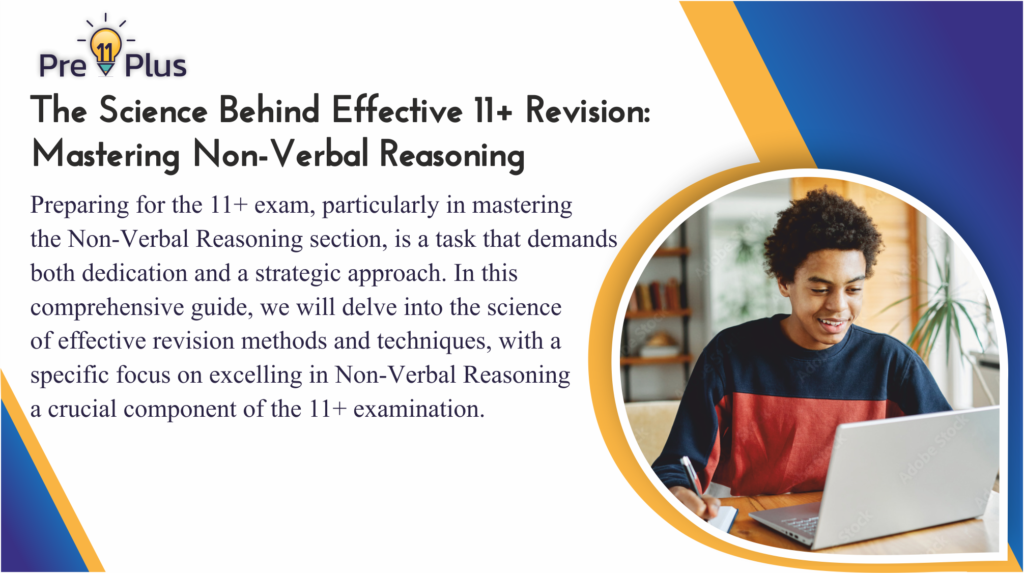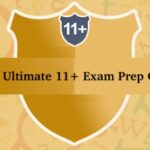The Science Behind Effective 11+ Revision: Mastering Non-Verbal Reasoning
Preparing for the 11+ exam, particularly in mastering the Non-Verbal Reasoning section, is a task that demands both dedication and a strategic approach. In this comprehensive guide, we will delve into the science of effective revision methods and techniques, with a specific focus on excelling in Non-Verbal Reasoning—a crucial component of the 11+ examination.
Understanding the Importance of Non-Verbal Reasoning:
Non-verbal reasoning evaluates a student’s ability to analyze visual information and make logical deductions. It assesses skills such as pattern recognition, spatial awareness, and problem-solving—skills that are invaluable not only for the 11+ exam but also for critical thinking and problem-solving in everyday life.
The Science of Effective 11+ Revision:
-
Active Learning:
Research has shown that active learning is one of the most effective revision methods. Engaging with Non-Verbal Reasoning questions actively—by attempting to solve them rather than just passively reading—helps in better retention and understanding of concepts.Active learning taps into the brain’s natural inclination to learn through experience and hands-on activities. When students actively engage with Non-Verbal Reasoning questions, they stimulate multiple regions of the brain involved in visual processing, memory, and problem-solving. This active engagement enhances their comprehension of patterns and spatial relationships, which are essential skills for Non-Verbal Reasoning.
-
Spaced Repetition:
Spaced repetition is a scientifically proven technique that involves reviewing and revising material at increasing intervals over time. This method leverages the psychological spacing effect, which shows that information is better retained when it is reviewed at intervals rather than in a single, concentrated session. Applying spaced repetition to Non-Verbal Reasoning concepts ensures that students revisit and reinforce their understanding over time. The brain benefits from this approach by strengthening the neural connections associated with visual pattern recognition and logical reasoning, making it easier to recall and apply this knowledge during the 11+ exam.
-
Interleaved Practice:
Interleaved practice, which involves mixing different types of questions or subjects, has been found to improve overall learning. For Non-Verbal Reasoning, this means combining various question types to enhance adaptability and problem-solving skills.When students practice different types of Non-Verbal Reasoning questions in an interleaved manner, they challenge their brain to adapt to varying visual patterns and problem-solving strategies. This cognitive flexibility is crucial for excelling in the Non-Verbal Reasoning section, where questions can vary significantly in their complexity and structure.
-
Visual Learning:
Non-verbal reasoning is inherently visual. Utilize visual aids such as diagrams, charts, and flashcards to reinforce understanding and improve spatial reasoning. Visual learning is highly effective for Non-Verbal Reasoning because it aligns with the way the brain processes visual information. Visual aids can simplify complex patterns and spatial relationships, making them easier to grasp and remember. Encouraging students to create their own visual representations of Non-Verbal Reasoning concepts can further enhance their comprehension and retention.
-
Metacognition:
Encourage metacognition—the awareness and understanding of one’s own thought processes—during Non-Verbal Reasoning practice. This helps students reflect on their problem-solving strategies and adapt them as needed. Metacognition is a powerful tool for improving Non-Verbal Reasoning skills. By encouraging students to think about how they approach different types of questions, they can refine their problem-solving techniques and become more efficient in recognizing patterns and making deductions.
-
Chunking:
Chunking involves breaking down complex information into smaller, manageable chunks. Apply this technique to Non-Verbal Reasoning questions by identifying patterns and breaking them into simpler components for easier analysis. Chunking is particularly useful for handling complex Non-Verbal Reasoning questions. By breaking down intricate patterns into smaller, more manageable parts, students can approach these questions systematically, enhancing their ability to identify key elements and make logical deductions.
-
Active Recall:
Active recall involves recalling information from memory rather than simply rereading it. Use flashcards or practice quizzes to actively recall Non-Verbal Reasoning concepts and patterns. Active recall reinforces memory and comprehension of Non-Verbal Reasoning concepts. When students actively retrieve information from their memory, they strengthen the neural pathways associated with that knowledge, making it easier to access during the 11+ exam.
-
Feedback and Error Analysis:
Regular feedback and error analysis are critical to effective revision. Reviewing mistakes made in Non-Verbal Reasoning questions helps identify weaknesses and areas for improvement. The brain learns from mistakes. When students review their errors in Non-Verbal Reasoning questions, they identify misconceptions and refine their problem-solving strategies. This process fine-tunes their ability to recognize patterns and make deductions accurately.
Conclusion:
Effective 11+ revision, particularly in mastering Non-Verbal Reasoning, is not merely about rote memorization but about engaging with the material in a scientifically proven manner. By applying active learning techniques, embracing the principles of spaced repetition, and leveraging the brain’s neuroplasticity, students can enhance their Non-Verbal Reasoning skills significantly.
Success in the 11+ exam’s Non-Verbal Reasoning section is not just a testament to hard work but also a demonstration of the brain’s adaptability and capacity for improvement. A strategic approach to revision grounded in science sets the stage for excellence in Non-Verbal Reasoning and, ultimately, success in the 11+ exam.












